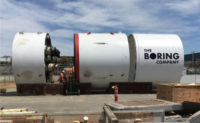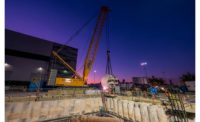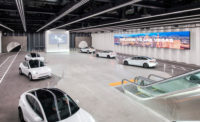Controversial billionaire Elon Musk is assembling a team of industry veterans and newcomers with which to pursue his dreams of transforming public transportation. Musk’s upstart firm beat three other teams on June 14 to win the exclusive right to negotiate a design-build-operate-maintain contract with the City of Chicago.
Musk plunged his automobile business, Tesla, into controversy by tweeting his desire to take the company private and then reversing the decision.
The Boring Co.'s proposal involves a high-speed underground passenger transport system between the downtown Loop area and Chicago O’Hare International Airport. The plan is based on providing a one-way trip of about 12 minutes at 150 mph compared with the current 40-minute average. The company also recently unveiled plans for a tunnel/high-speed transit system from Los Angeles International Airport to Dodger Stadium.
Musk plunged his automobile business, Tesla, into controversy last month by tweeting his desire to take the company private and then reversing the decision. Lawsuits quickly followed, as well as news reports that portrayed Musk as suffering from overwork and frayed nerves. Some reports contained speculation about his ability to steer Tesla to profitability.
 |
|
The original timetable for the planned O'Hare Express procurement process (Source: Chicago Infrastructure Trust). |
Musk's Boring Co. is pledging to build and pay for what would be an unusual system of public transportation. The company's Chicago proposal calls for transporting passengers on eight-wheeled “skate” cars built on a modified, Tesla Model X chassis.
So far, The Boring Co.'s chief sources of revenue have been its sale of a flamethrower-like device, called Not a Flamethrower, and a baseball cap.
The tunnel ventures will require another type of expertise. In April The Boring Co. hired away Mike Wongkaew from Mott MacDonald, where he worked for decade as principal engineer (structures) and tunnel design manager, according to posts on LinkedIn.
Before Mott MacDonald, Wongkaew worked for Parsons Brinckerhoff. He will be The Boring Co.'s chief tunnel engineer.
Mott MacDonald had been part of a consortium of companies that made the shortlist for the Chicago tunnel project, only to lose out to Musk. The group also included Meridiam, Antartica Capital, JLC Infrastructure, and First Transit.
Patrick O’Leary, the structures engineering designer at The Boring Co., joined last year after a short stint at Virgin Orbit.
O’Leary previously worked for 13 years at SpaceX, another Musk company. His work record in engineering stretches back to the 1970s and includes stops at Northrop Grumman, Starsys Research, and Raytheon, among others.
Michael Sagan, who was one of the first Musk executives to look at the Chicago tunnel project, is also a relatively old hand, having worked as deputy general counsel at SpaceX for nearly a decade.
Other Recent Hires
Still, not everyone on the engineering side has such an extensive resume.
The Boring Co. last fall hired Arwa Tizani, an engineer in training, from Ware Malcomb, where he did utility design and site planning for commercial businesses. His previous experience included a stint four years ago as an engineering intern for the city of Santa Ana.
The firm’s regulatory counsel, Ashley Steinberg, will play a role in obtaining needed environmental permits. Steinberg, who has been pushing for tariff exemptions from the Trump Administration for tunnel parts imported from China, graduated from Stanford University Law School in 2011. Steinberg worked as a senior associate in the international trade group of Washington, D.C., law firm of Hogan Lovells before joining The Boring Co.
Open Positions Advertised
The Boring Co., according to its website, is also on the hunt for a manufacturing, fluid power, software, electrical and industrial automation engineers. The company also seeks a TBM operator, safety specialist and gas tester.
Musk’s firm must nail down regulatory permits and approvals in some of the nation’s largest cities, an endeavor that involves navigating the treacherous political currents of big city politics. It is a task major for which companies often bring on high-powered lobbying and public affairs firms with deep ties to local political power structure.
Musk and The Boring Co. have kept a low profile on their plans, declining interview requests. The Chicago Infrastructure Trust has declined comment as well, citing ongoing negotiations.
The secrecy around what is a major public project has its critics. The Better Government Association has sued the Chicago Infrastructure Trust and the city of Chicago, seeking release of documents on The Boring Co.’s proposal and agreement with the city for the O’Hare tunnel.
And in Los Angeles, organizations representing residents in the wealthy Brentwood and Pacific Palisades neighborhoods filed suit in the spring, arguing Musk’s plan to build a 2.7-mile test tunnel must go through the environmental permitting process. That would require an extensive public airing of his plans.
This story was changed Sept. 24 to eliminate a reference that confused Musk's proposed Chicago system with his ideas to use hyperloop technology, which are not part of the Chicago proposal.






Post a comment to this article
Report Abusive Comment